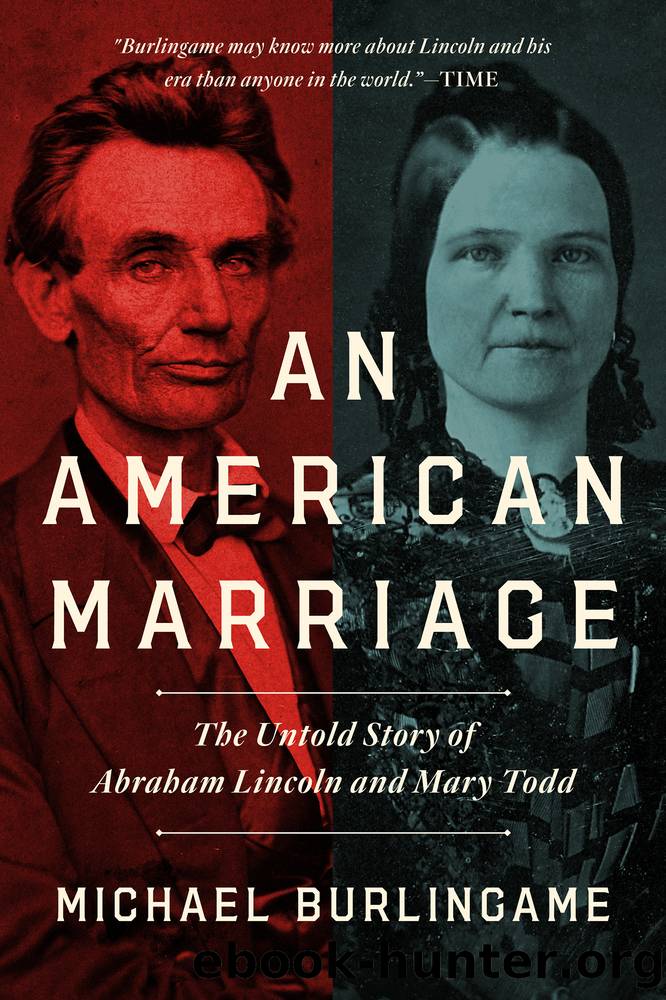An American Marriage by Michael Burlingame

Author:Michael Burlingame [Burlingame, Michael]
Language: eng
Format: epub
Published: 2021-06-02T00:00:00+00:00
MRS. LINCOLNâS EMOTIONAL FRAGILITY
Herndon could have added that Lincoln placated his wife because he feared she was teetering on the verge a nervous breakdown. In 1862, after the death of their son Willie, he told her that he might have to have her committed to an insane asylum. Once in conversation with Phineas Gurley, pastor of the Washington church where the First Family worshipped, Lincoln indirectly alluded to his willingness to meet the First Ladyâs unreasonable demands. Dr. Gurley had appealed on behalf of a parishioner seeking a full pardon for his adolescent son whose death sentence Lincoln had already reduced to a prison term. Therefore Dr. Gurley warned against bothering Lincoln with a further plea. The father âreplied that he felt so himself but he fearedâ that his wife âwould lose her mind if something were not done.â So he submitted his appeal to Lincoln, who responded angrily: âI saved the life of your son after he had been condemned to be shot; and now you come here so soon when you know I am overwhelmed with care and anxiety, asking for his pardon. You should have been content with what I have done. Go; and if you annoy me any more, I shall feel it to be my duty to consider whether I ought not to recall what I have already done.â A few days later, Lincoln apologized to the father and pardoned his son. To Dr. Gurley, the president explained that he was induced to change his mind âonly by the statement of the father that he feared his wife would lose her mind if something were not done to relieve her.â Lincoln then smiled and said: âAh, Doctor! these wives of ours have the inside track on us, donât they?â
Lincoln also expressed anxiety about his wifeâs psychological well-being in 1863. While urging Emilie Todd Helm to spend the summer with his family at the Soldiersâ Home, he explained: âyou and Mary love each otherâit is good for her to have you with herâI feel worried about Mary, her nerves have gone to pieces; she cannot hide from me that the strain she has been under has been too much for her mental as well as her physical health. What do you think?â
Mrs. Helm replied that her sister âseems very nervous and excitable and once or twice when I have come into the room suddenly the frightened look in her eyes has appalled me. She seems to fear that other sorrows may be added to those we already have to bear.â
In response, Lincoln pleaded: âStay with her as long as you can.â But Mrs. Helm remained only a few days before returning to Kentucky.
When William P. Wood, superintendent of the Old Capitol Prison, informed the president that the First Lady was selling âtrading permits, favors and government secrets,â Lincoln attributed her behavior to âpartial insanity.â
Lincoln may well have worried about his wifeâs mental health long before he became president. In 1844, while stumping for Henry Clay in
Download
This site does not store any files on its server. We only index and link to content provided by other sites. Please contact the content providers to delete copyright contents if any and email us, we'll remove relevant links or contents immediately.
Blood and Oil by Bradley Hope(1567)
Wandering in Strange Lands by Morgan Jerkins(1430)
Ambition and Desire: The Dangerous Life of Josephine Bonaparte by Kate Williams(1395)
Daniel Holmes: A Memoir From Malta's Prison: From a cage, on a rock, in a puddle... by Daniel Holmes(1336)
Twelve Caesars by Mary Beard(1324)
It Was All a Lie by Stuart Stevens;(1300)
The First Conspiracy by Brad Meltzer & Josh Mensch(1174)
What Really Happened: The Death of Hitler by Robert J. Hutchinson(1167)
London in the Twentieth Century by Jerry White(1149)
The Japanese by Christopher Harding(1135)
Time of the Magicians by Wolfram Eilenberger(1132)
Twilight of the Gods by Ian W. Toll(1123)
A Woman by Sibilla Aleramo(1099)
Cleopatra by Alberto Angela(1096)
Lenin: A Biography by Robert Service(1080)
John (Penguin Monarchs) by Nicholas Vincent(1073)
The Devil You Know by Charles M. Blow(1029)
Reading for Life by Philip Davis(1027)
The Life of William Faulkner by Carl Rollyson(995)
